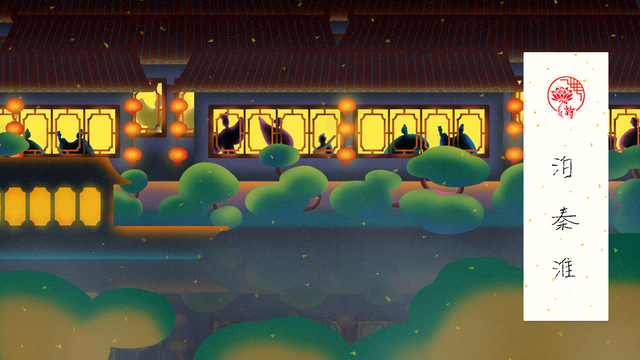Chinese poem - “Mooring by the Qínhuái” by DU Mu (Includes original song and video) | 《泊秦淮》- 杜牧 (內有原創樂曲及影片)
Hi everyone, CCP are back again. How did you like the poem we introduced last week? Did that make you sad or bring back any unhappy memories? This week we're still staying on the river, but a different one. Have you ever rowed in the river? Perhaps with a bottle of wine and your loved one, slowly drifting along. And when you get a bit tired, just lie back and relax, listen to the water trickle by and the gentle sun brushing your face. Sounds absolutely idyllic. Yet a thousand years ago, our man this week felt very different when he was by the river.
大家好,《樂筆詩塾》再次和大家見面,不知道看完上一回《楓橋夜泊》的介紹,大家身邊有沒有多了一瓶酒,多了一份愁?
先讓我們拋酒棄愁,讓我們來跟大家說說河的故事。如果大家試過撐舟河畔,定必不能忘懷當中的寫意,撐到累時,輕躺舟上,耳聽著河水的流動,感受著溫䁔的陽光,何其寫意,如果身邊有一瓶酒,佳!如果身邊就是你的伴侶,更佳!
這樣的寫意總讓人心醉,殊不知在一千多年前的中國詩人,卻對此河此境感到痛心,今次,讓我們看看中國其中一首主題為河中最著名的其中一首詩歌。

The Background 創作背景
The Qinhuai River is a tributary of the Yangtze River and flows through Jin Ling, which is the modern day Nanjing. Ever since the Three Dynasty Period around 200 AD and all the way up to the Chen Dynasty, Jin Ling has been the capital for six dynasties over the four centuries. It is true to say that Jin Ling has witnessed much ups and downs over the centuries.
In the old days, the area along the Qinhuai has always been the busiest. Residentials, businesses, hotels for the many visitors passing through the city and entertainment businesses all set themselves up along the Qinhuai. Our poet this week DU Mu, was from the late Tang dynasty and was born into a elite family. His grandfather was a minister at the Tang court, and he had a great interest in politics. He wrote “Mooring by the Qínhuái” when he was staying there one day, and was saddened by the state of current affairs where the rulers were just interested in enjoy themselves despite the Tang dynasty was gradually falling into enemies hands.
秦淮河,位處金陵(今日的南京)一帶。自三國時代孫權定都於建業,及後東晉、南朝的劉宋、南齊、南梁、陳朝,共六個朝代均以金陵為國都,因此南京又有「六朝古都」的稱呼。作為「六朝古都」,金陵可謂見證了朝代的興亡更迭。
秦淮河作為六朝古都的居住區及商業區,曾經繁華一時,沿岸開遍供旅客商人、達官貴人消遣娛樂的酒樓與煙花之地。詩人杜牧所處的晚唐,經歷過地方「節度使」反叛的「安史之亂」後,國事衰微、世風頹靡。然而統治者依然沉溺於歌舞昇平的生活,未有國家隨時覆滅的危機感,不禁讓憂國憂民的杜牧深深感到擔憂。
杜牧出身政治世家,是西晉軍事家杜預的十六世孫,祖父更是唐朝著名的宰相杜佑。因此杜牧非常關心政治,曾撰寫《罪言》、《戰論》、《守論》、《原十六衛》等闡述藩鎮問題和用兵方略的文章,期望能改變大唐漸漸積弱的局面。
《泊秦淮》一詩,便是寫杜牧夜泊秦淮所見所聞的感受,揭露晚唐統治者沉溺聲色,醉生夢死的腐朽生活。杜牧的愛國情操,實在值得今人深思。

Mooring by the Qínhuái by DU Mu杜牧《泊秦淮》

煙籠寒水月籠沙,夜泊秦淮近酒家。
yān lóng hán shuǐ yuè lóng shā , yè bó qín huái jìn jiǔ jiā
商女不知亡國恨,隔江猶唱後庭花。
shāng nǚ bù zhī wáng guó hèn , gé jiāng yóu chàng hòu tíng huā

The Composition 詩句大意
Mooring by the Qinhuai consists of 4 lines, and is best explained in 2 parts.
《泊秦淮》共四句,按詩的結構劃分,可分為兩個層次。
Part 1 : The hazy cold evening at Qinhuai 層次一:朦朧冷清的秦淮河夜景
「煙籠寒水月籠沙」
yān lóng hán shuǐ yuè lóng shā
The haze covers the cold river, as does the bright moon over the sand banks
迷濛的煙霧包圍著寒江,皓月的清輝亦籠罩著沙渚。
「夜泊秦淮近酒家」
yè bó qín huái jìn jiǔ jiā
Late at night, the boat moors at the Qinhuai near the restaurants
入夜時分,船泊在秦淮河畔,靠近岸邊的酒家。
Part 2 : The absurdity of the bustling night scene 層次二:歌舞繁華的荒誕
「商女不知亡國恨,隔江猶唱後庭花」
shāng nǚ bù zhī wáng guó hèn , gé jiāng yóu chàng hòu tíng huā
The hostesses from the entertainment establishments continue to sing “Jade trees in the back garden” oblivious to the pain of the dying empire
專門侍候客人的歌女不知什麼是亡國之恨,依然在對岸吟唱着淫靡之曲《玉樹後庭花》。

The Poetic Structure 格律特點
Sentence 句式
There are four lines in this poem making it a quatrain (a poem that consist of four lines) , and each line has seven words, so this is classified as a 7 word quatrain.
全詩共四句,符合絕詩四句的句式特點。而全詩每句均是工整的七個字,可先將此詩納為「七言絕詩」。
Rhythm 押韻
The final in the last word in the second line is jia, and in the fourth line is hua. Both end with the same final “a” thus follows the rhyming characteristic required for a 7 word quatrain
先選取雙句句末的字作韻母分析,即「家」、「花」。「家」的粵音韻母是「aa」,普通話韻母是「ia」;「花」的粵音韻母是「aa」,普通話韻母是「ua」。
因此《泊秦淮》以「a」一韻到底,符合「絕詩」的押韻特點,可以判斷此詩屬於「七言絕詩」。

The Music and Sketch 《泊秦淮》的歌與畫
In our sketch for Mooring by the Qinhuai this week, we have tried to portray the contrast between the loneliness and helpless poet sitting on his boat, against the bustling night scene across the river. For the music, we have reverted to a more traditional Chinese tune this week, and the singing is performed by @susanlo and @tine for the Mandarin and Cantonese version respectively.
In addition to the lyrics from the poem, we have also remixed in the lyrics from “Jade trees in the back garden”, which appears in the fourth line of the poem. “Jade trees in the back garden” is said to be a song written by the last ruler of the Chen Dynasty who reigned between 582 to 589. As his dynasty was in decline, all the emperor was interested in was literature and women. “Jade trees in the back garden” is thus also known as the song of the dying empire.
請大家欣賞我們為《泊秦淮》所編的曲與畫,在畫中,我們嘗試營造出孤寂的秦淮河,僅那遠處的花船有著點點燈火,船內眾人嬉戲玩樂,風流才子對酒銷金,與船外的孤寂形成強烈對比。在歌曲方面,我們再一次邀請了@susanlo為我們獻唱國語部份,而粵語部份則是由@tine演唱,這次的歌曲以中國風為曲調,帶有一種奢侈靡爛的感覺,在歌曲中段,我們加插了一段《玉樹後庭花》的詞,這詩由陳朝最後一位君王陳後主所寫,講述的是後宮妃嬪靡麗之事,被稱為「亡國之音」,這一段《玉樹後庭花》,正呼應了《泊秦淮》最後一句「隔江猶唱後庭花」。

Highlight of the poem精選句子

「商女不知亡國恨,隔江猶唱後庭花」
The hostesses from the entertainment establishments continue to sing “Jade trees in the back garden” oblivious to the pain of the dying empire
“Jade trees in the back garden” reminded DU Mu of the same state of his country. The Tang Dynasty was on the brink of collapse yet the emperor was too engrossed in his own happiness. Likewise, the hostesses were just concerned about singing for clients and getting more tips, nobody seemed to care about the country collapsing.
If we look around us, there are many who are more disadvantaged than us, who are in need of help and support. Perhaps we should take a moment and step back from focussing on ourselves, and see how we can collectively make this a better world. The world needs to unite together, and what better way to do this than through a global activity like the upcoming World Cup. A sport that originated from China 2000 years ago!! Next week let’s all join in the World Cup mania, and we'll introduce a poem about football.
傳聞《玉樹後庭花》是南朝陳後主所作的樂曲,被後人稱爲「亡國之音」。詩人杜牧從陳後主所寫的一曲《玉樹後庭花》,想起陳後主的荒淫亡國,更聯想到晚唐正在重蹈南朝的覆轍,不禁感慨萬千。
我們實際上也像秦淮酒家的賣唱歌女,只關注自己的切身利益,如同歌女只在意所唱的歌曲能否獲得更多客人的賞錢,沉溺於紙醉金迷的物質生活。當我們願意靜下來仔細觀察周遭所發生的事情,會發現身邊有很多需要人們幫助的弱勢社群。
嘗試從今天開始,省下風花雪月的奢華開支與時間,用以關懷幫助有需要的人,集合我們的力量,為整個社會帶來互助友愛的正面風氣。
幸好,今天的社會雖仍有不幸,但已比古時好得多了,至少沒有太多的戰亂,沒有太多的饑餓,更有全球一體的快樂,全球一體的狂熱。知道我要說什麼了嗎?男生們,你們一定知道的,四年一度的盛事,原來竟源於二千多年前的中國,下一期,讓我們一起噢嘞,噢嘞,噢嘞!
Production Team 製作團隊
Literature Translation 詩歌解析: @perlia
Music 音樂: @kona
Art 插圖: @nanosesame
Video 視頻: @aaronli
English Editor 英語編輯: @livinguktaiwan
Chinese Editor 中文編輯: @aaronli

My video is at DLive

哇,才艺巨献啊。
诗 画 音 皆出色,难得的是融为一体!
謝謝!
巨獻不敢當啦😆不過都是大家的心血,是真的~(謝謝組員們)
組員們太厲害了🎉🎉🎉
謝謝詩人讚賞😍受寵若驚!
很期待下一首的 @kona 的歌和 @nanosesame 的畫呢😍😍 很感謝 @susanlo 和 @tine唱CCP,你們的聲音實在太動人,「意境」都唱出感覺來😘😘太厲害了
謝謝perlia! 你的解析也做得一樣好😍
我的點讚厲害嗎?
厲害厲害🍻🍻🍻
厲害厲害,最厲害就是你啦😌😏
不可以抹煞其他組員的努力。
沒有解析我都不會畫了
沒有詩我也可以畫.... 年輕人終究是年輕人
我真的滿年青der~ 開心
這樣也能開心.... 年輕人終究是年輕人
唸書的時候就很喜歡這一句呢,謝謝@susanlo為我們呈現好聽的歌聲還有@nanosesame每期都棒棒的畫作❤️
下一期是要講蹴鞠了咩😂
可能下一期是講隻盃😝😝
謝謝你的欣賞!😆下一期.....敬請期待!
東施效顰,創作一首。
天擁油傘燈擁楓,日遊惠州歇小館。
港女不管中美戰,隔灣大啖東北菜。
很深喔!怎麼翻做英文???? 😥😥
你覺得很深喔?我覺得是很酸吧?^^
水擁輕煙舟擁燭,疑闖仙境把足駐。
朱雀與鵰世相爭,唯與杜康相訴苦。
🍻!
全個腦袋都是把你們的字變為音符,你們太厲害了吧,出口成詩👏👏👏👏
我比較喜歡這版本:
水有鉛粥有煮,一串鮮爬豬豬。
兩隻鳥用蒸的,加了酒苦苦的。
我也比較喜歡這個版本TVT
港女,您學了東施,那您是南施還是北施?
東施小姐?☺️ 您寫了首詩,我和了您的詩,那我就叫和東詩,哦不,河東獅,不對不對,河東施吧!
m r l, d m r l, t, l, m s r m m
l s m s l s s s l m s l l s~~~
正!哈哈
果然是唱歌的,一看就明👍👍👍
哈哈其實我真的不懂的。
哈哈,正!
你好。
我是外国人。我觉得你的写作有点长。
Thank you for the comment! May I have more details? Does it mean the content length (explaination, appreciation etc) or the editing of two languages of the post?
很优秀,太棒了
謝謝,請繼續追看我們的單元!
nice!
Thank you!
好有才华的团队,诗词翻译都能搞得定👍
組員們都專業非常,請繼續留意我們的動向!
Get your post resteemed to 72,000 followers. Go here https://steemit.com/@a-a-a